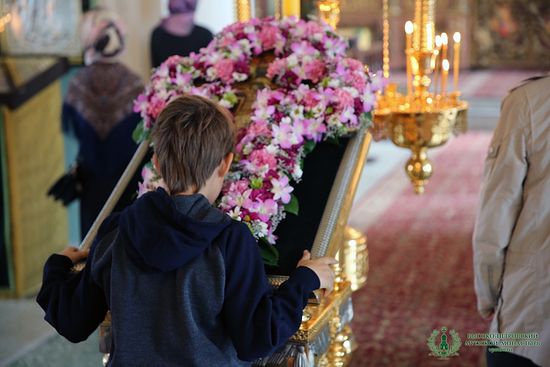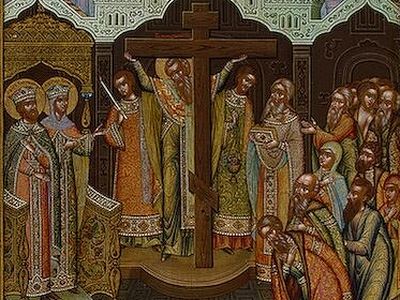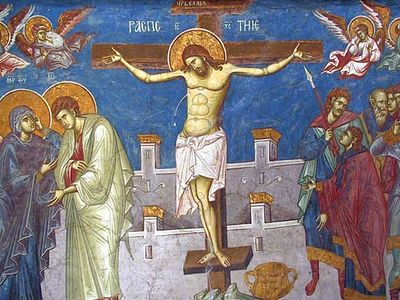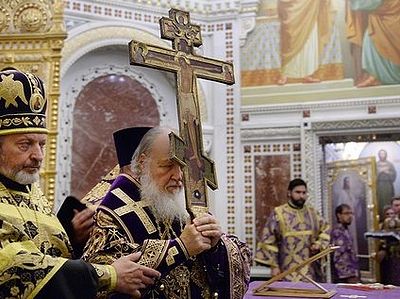In 2009, His Grace Bishop Meletiy of Khotin, Ukraine, now Archbishop of Chernovitsy, visited the St. George Church (ROCOR) in Howell, NJ. At the Divine Liturgy for the Leave-taking of the Feast of the Exaltation of the Cross, His Grace gave a sermon.
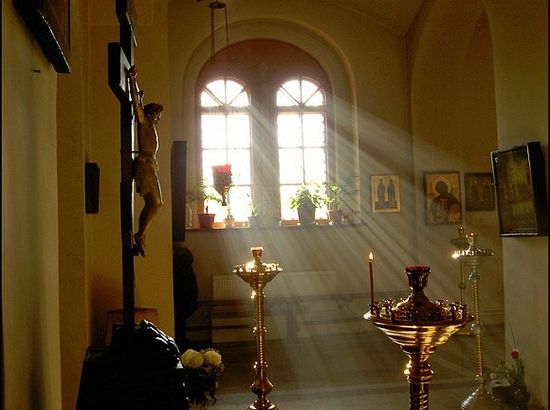
In the name of the Father, and of the Son, and of the Holy Spirit!
During the Divine Liturgy today, dear brothers and sisters, we heard wonderful words, the words of Christ the Savior, which were directed at the apostles, the contemporaries of the Savior. But at the same time, they were directed at each of us. Today is the Leave-taking of the Exaltation of the Cross, and we once again kneel both spiritually and physically before the Cross of our Lord and Savior. Today the Church commands us to read the following words during the Divine Liturgy, spoken by the Savior about the cross that each of us bears.
The Lord says that whosoever does not take his cross and carry it is not worthy of Him. These words are directed at every one of us. We were baptized in Christ, reborn in Christ, in the holy sacrament of Baptism. And we are called upon to be Christians. Often, however, we forget our calling. Often, we live by the laws of this world, which lies in evil. We forget that the carrying of our cross consists of living a good, Christian life. The carrying of our cross consists in finding love. The carrying of our cross means acquiring the Holy Spirit, in the words of St. Seraphim of Sarov.
How does one find love? How does one acquire the Holy Spirit? The Church, with Her centuries-old experience, shows us the way. We must live a Christian life. We must arrange our life in such a way that in every hour, every minute of it, we might remember our calling, remember Christ the Savior, who spilled His blood on the Cross for our sake, for our salvation. How do we do this? The Church says it is not that difficult. The Lord says that His yoke is easy and His burden is light. The yoke, that is, that which oppresses man, that which burdens man, has in fact no weight at all, and this is the yoke given to us by Christ.
If we live a Christian life, then we try to keep Christ in our thoughts. In our private lives, every one of us is required to devote our every day to the Lord, and for this we must begin our day immediately with prayer, calling down God’s grace, turning to the Savior that He might bless us in our new day. With any new undertaking, we must turn to the Lord. In concluding our day and retiring to bed, we must turn once more to God and ask that He bless our night and accept those good works done over the course of the day, and forgive us our sins committed over the course of the day.
Living this way, man received God’s grace. If one prays, if he turns to God, then the Lord will give him vision, consciousness, and a sense of the need to deepen our lives. One who prays can no longer hate another, judge another, or consider another worse than himself, because he is now a son of God; because he turns to God when he says the Lord’s Prayer. With these words, one bears witness not only to his faith, but also to his Christian life.
Living like this, in prayer, in constant remembrance of his calling, one senses the necessity of union with God. For the sake of this opportunity, he prays not only at home, but on Sundays and feast days, he hurries to common prayer in the house of God, so that here, with one mouth and with one heart, he might glorify his Creator, his Savior, his Provider, and might tie his voice together with those of the other faithful—whom he not only must love, but does love, in accordance with his calling.
Common prayer awakens one to a deeper sense and more attentive attitude toward his life. And then one realizes that without the sacraments, without receiving God’s grace in the Holy Gifts, his life is meaningless. No matter what heights one might achieve, what mighty posts one might occupy, what wealth one might accumulate, what great health one might have, all of this is fleeting. Today it has some meaning, and moves us to action; but, as time passes, everything in this world passes. Human glory passes, riches pass, health passes, and one nears the point at which he will have to answer for the whole of his life.
If this life was devoted solely to the acquisition of the worldly, to the accumulation of wealth, to the preservation of good health, to becoming smarter or more able, then such a life is wretched, because he failed to attain the most important goal—he did not search for that salvation, which changes human nature, which awakens us all to independent thought, which lifts us up to God, which teaches us love for God and one another. And he who realizes this, rushes to the holy sacraments. He realizes that without the sacrament of Confession, he cannot be freed from the burden of his sins, which he has placed upon himself. Without the sacrament of Communion, he cannot unite with the Source of life, Christ the Savior.
And then, one realizes and understands that life in the Church is the most important part of his existence here on earth. It does not take up that much time, for the Church does not command or teach each of us to spend all day, every day in God’s house, although such a thing is possible for some—those who have renounced this life, and live in the holy monasteries. But we, people living in the world, give but a part of our time to God, and that part sanctifies our life. And we must give this part generously, and with a sincerity that draws us closer to God, that opens eternity to us, that guarantees us that one day we will be justified before the dread Judgment Seat of Christ.
We are children of the Church, and we must remember that the Church is a part of our lives. We must live a life in the Church, and only then will we draw near to God, only then the real meaning of our existence is opened for us. But life in the Church requires sacrifice. Not only material sacrifice, although that is also needful—needful for us chiefly because, as we remember from the Old Testament, the people received God’s blessing for their tithes. In giving a tenth of his belongings, of what he earned, a person became blessed in God’s sight through his tithe; he received God’s blessing. The tithing law has not been overturned, and each of us must support the Church, must struggle to contribute our mite—that holy work done here on this earth.
And this sacrifice is our external sacrifice. Our principal sacrifice, however, is spiritual. It is a sacrifice wherein we offer unto our neighbors and those who surround us, a part of our soul. When we begin to love those who surround us, our life changes, because we, overcoming our various ambitions, our desires, our egoism, dedicate our lives to our neighbors. If this takes place, then our neighbors will also be filled with love, and then the words spoken by venerable St. Seraphim of Sarov will be fulfilled: "Acquire the spirit of peace, and thousands will be saved around you." Because the spirit of peace not only changes a person, but becomes visible to those surrounding that person, as well. And then one becomes a conduit for God’s mercy; he helps not only himself, but his neighbors, to draw closer to God.
Our lives flow forward, and if you were to ask each of us, regardless of our age, be we 10, 15, 30, 50, 70 – each of us would bear witness to the fact that the years have flown by like a single minute. The Holy Psalmist David writes that the life of man is as mist, which appears and vanishes, or as a flower of the field, which flourishes beautifully, but dies tomorrow, and will be missed by none. So it is with man. Amen.
